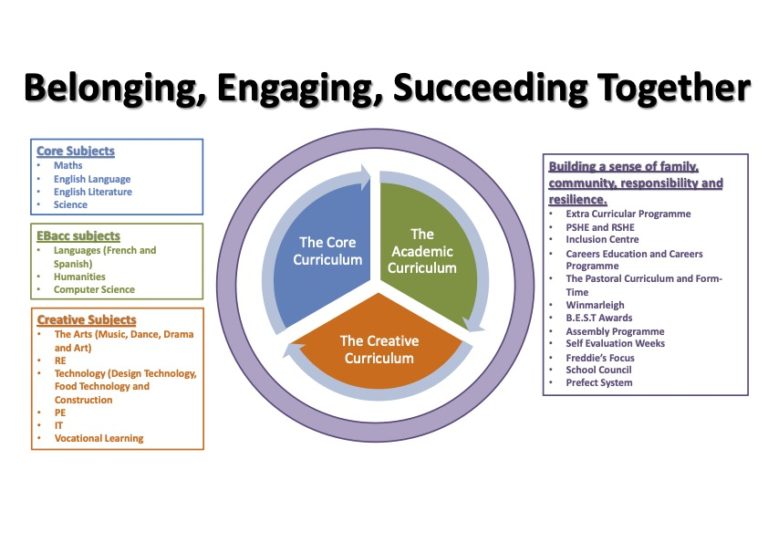Curriculum Statement
Curriculum Statement
Curriculum Statement
Home > Curriculum Statement

Fred Longworth High School aims to provide a curriculum which provides all students with the foundations of knowledge and skills to enable them to be lifelong learners and achieve success in school and throughout their life. Furthermore, they will be equipped with a good understanding of the world around them so that they can make a positive contribution to their local, national and international communities.
The school is committed to providing a curriculum that is broad, balanced, challenging and fosters a love of learning. We match our curriculum to the abilities, interests and aspirations of our students, to give every child the opportunity to strive for personal excellence. As a school, we aim to open doors for every pupil, and we therefore value the contribution that academic, creative, practical and vocational learning brings to a child’s development. Our hope is that every child who leaves Fred Longworth High School has the qualifications, skills, knowledge and character to access aspirational Post-16 opportunities and to lead a life that includes positive relationships, resilience and financial independence.
Our Curriculum intent is enshrined in the school’s B.E.S.T vision:
How our curriculum is organised and delivered
In order to fulfil these ideals, our five-year curriculum requires pupils to engage with a wide range of subjects in Year 7, 8 and 9 and then provides a more bespoke approach through our “options routes” in Years 10 and 11.
Beyond the classroom, we aim to open the door to a wide range of experiences. The curriculum is supported by a rich and varied extra-curricular diet, which all students are encouraged to take part in.
The diagram below outlines in visual form, an over view of our curriculum (click to enlarge).
Years 7 to 9 (Key Stage 3 or KS3)
The KS3 curriculum serves a clear purpose in every subject at Fred Longworth High School. Curriculum teams plan their schemes of work to ensure they deliver the relevant content of the national Programme of Study, and that high challenge, enjoyment and enquiry are at the heart of learning.
Year 7 students study a broad range of non-core subjects from day one. MFL, History, Geography, Religious Studies, Computing, Technology and Physical Educations are integral to our curriculum alongside a strong emphasis on Art, and the Performing Arts, an enduring legacy of the school’s status as a successful arts college.
At KS3 class groups are organised into two ‘bands’ of 5 parallel groups North and South. We use a mixture of mixed ability teaching and setting. Core subjects are taught in sets whilst other areas of the curriculum favour more mixed ability groups. In both Y7 and Y8, the Arts are always taught in form groups and we do this deliberately to develop cohesion within each form, which in turn contributes significantly to the family ethos of the school.
Years 10 to 11 (Key Stage 4 or KS4)
The options process takes place in Year 9 at Fred Longworth High School. Through this process, we aim to give our pupils as much choice and flexibility as possible, whilst ensuring they follow examination courses that lead to positive outcomes and give them access to Post-16 opportunities at the correct level. Year 9 students are allocated a recommended options ‘route’ (Q or U) according to their ability and aspirations and are asked to choose up to four Options subjects. Option Route Q prioritises the English Baccalaureate subjects, which we believe opens the doorway to many opportunities in employment and Higher Education; in addition, students in Option Route Q may access the Triple Sciences. Students in Option Route U can also access the EBacc should they choose to do so.
A range of Vocational Qualifications are available to students in every options route. We allow the same amount of curriculum time to Vocational Qualifications as GCSE courses to allow pupils the experience of exciting and relevant work-based projects alongside their assessed content. Please see the Options page for more information on the qualifications we offer on each route.
The teaching of option subjects at KS4 is in largely mixed ability groups whilst the teaching of English, Maths and Science is across three ability bands.
Raising aspiration is an absolute key tenet to our curriculum. We have very strong provision for careers education, which was recently recognised through receipt of the Inspiring IAG Award for Excellence in Careers Provision. As well as discreet careers lessons in Y10 and Y11, a number of Faculties have also established links with external providers and employers who will regularly come into school to speak to students, or to arrange visits to places of employment or further education. We organise careers conferences and world of work theme days at various points throughout the year. Our STEM links and links within the Construction industry are particularly strong and continue to evolve; the governing body ably supports the school in growing these links.
Supporting Students with SEND - Ensuring a Quality Education For All
- SEND is the responsibility of every professional in our school. Every teacher is a teacher of SEND, and every leader is a leader of SEND.
- The school is inclusive by design. SEND is a ‘golden thread’, not an afterthought or a bolt on and SEND is at the heart of school priorities.
- Decisions about our approach to SEND are made in conjunction with a range of stakeholders including parents, carers and families, teaching and non-teaching staff, students, and specialist outside agencies.
- SEND is fluid and not a permanent status for all students. There is recognition that at a certain time a child has additional learning needs that may require tailored or additional support to fully participate in everything the school has to offer.
- Students who have Special Educational Needs and Disabilities are entitled to provision that supports achievement at, and enjoyment of, school and to have full participation in the community of the school.
- High expectations are set of the holistic progress of any students who has SEND to have positive outcomes and a rich and happy experience at school.
- Sharp well-informed and well-defined approaches are used to enable effective learning opportunities and close attainment gaps to their peers.
- A dynamic assess, plan, do, review approach which continually reflects on how to change the quality of what happens in the immediate environment to best support the student’s experience, taking into account the individual, the home and wider community, and time.
- The expectation should be that the needs of all students must be addressed, first and foremost, through excellent classroom teaching.
Through our work, we aim to ensure that all our students can say with confidence:
- My teachers know me, understand my needs, challenges and barriers or medical needs.
- My teachers check that I understand and revisit me at other points throughout the lesson.
- My teachers challenge and support me to reach excellence and understand that sometimes it may take me a little longer to get there (they never make me feel like I’ll be unable to achieve what the others in my class can achieve)
- My teachers make sure I am seated in the best place to support my learning.
- My teachers make sure that any resources they use are suitable for me so that I can access the work (but they don’t make things obvious in front of other students which means I don’t feel embarrassed or inferior to my peers).
- My teachers always make me feel included in the lesson for example during Q &A (but they are also really good at understanding how to build my confidence during Q and A).
- My teachers understand that if I need a little extra support with reading, they build my confidence by supporting me with strategies which may help me to grapple with difficult texts.
- I feel understood and looked after.
1. Effective parental engagement for students with SEND
Active parental engagement ensures provision is well informed and effective. Strong communication allows for a positive dialogue about learning where parental feedback refines and improves provision further. School provides a true meaningful culture of support offering parents access to a wide range of other support professionals. On a day-to-day basis this looks like:
- Provide practical strategies to support learning at home
- School communications tailored to encourage positive dialogue about learning
- More sustained and intensive support offered where needed
- Celebrations of success
2. A positive and supportive environment for all students without exception
Fred Longworth High School promotes positive relationships, active engagement, and well-being for all students. We aim to ensure all students can access the best possible teaching and we adopt a positive and proactive approach to behaviour. On a day-to-day basis this looks like:
- Adult-supervised safe-spaces, clubs and activities particularly during unstructured time
- Daily homework club to support development of independent learning skills
- Seating plans ensure needs are met in terms of sound, sight, lighting
- All students are active participants in lessons using a range of participation strategies including non-verbal strategies
- A mixture of streamed and mixed ability groupings and flexible grouping
- Explicitly prompt, model, reinforce and reward positive behaviours
- Know and understand students and their influences
3. Build an ongoing holistic understanding of students and their needs
A diagnosis of special educational need can direct generic and specific support. However, a better understanding of a student’s experience of school can provide information about their individual needs that can inform the next steps for teaching. On a day-to-day basis this looks like:
- Use a graduated approach- assess, plan, do review to understand learning needs. The process is repeated regularly as students’ development is not linear and students’ needs will vary in patterns of development over time.
- Regular and purposeful assessment with input from parents, student and specialist professionals
4. All students have access to high quality teaching
Improving high quality teaching for all students will improve outcomes for students with SEND. Teachers develop a repertoire of strategies they can use flexibly in response to individual needs and use them as the starting point for classroom teaching for all students, including those with SEND. On a day-to-day basis this looks like:
- Flexible grouping
- Cognitive and metacognitive strategies
- Explicit instruction
- Using technology to support
- Scaffolding
5. Complement high quality teaching with carefully selected small group and one to one intervention
Interventions can be a powerful tool but are used very carefully. High quality teaching reduces the need for extra support, but it is likely that some students will require high quality, structured, targeted interventions to make progress. On a day-to-day basis this looks like:
- Structured, evidence-based interventions
- Targeted interventions through identification and assessment
- Implementation of universal, targeted and specialist interventions
- Making links between learning in intervention and what happens in the classroom
6. Working effectively with Learning Coaches
LCs are not used to add value to what teachers do, not replace them. The role of the Learning Coaches is to help students develop independent learning skills and manage their own learning. On a day-to-day basis this looks like:
- Learning Coaches to supplement not replace the classroom teacher
- Careful deployment into subject areas
- Intensive programme of training to ensure Learning Coaches are fully prepared for their role in the classroom
- Teachers and Learning Coaches work together to maximise impact
- Used to help develop independent learning skills and manage their own learning
- Use only evidence-based interventions to support Learning Coaches in their small group and one-to-one instruction


